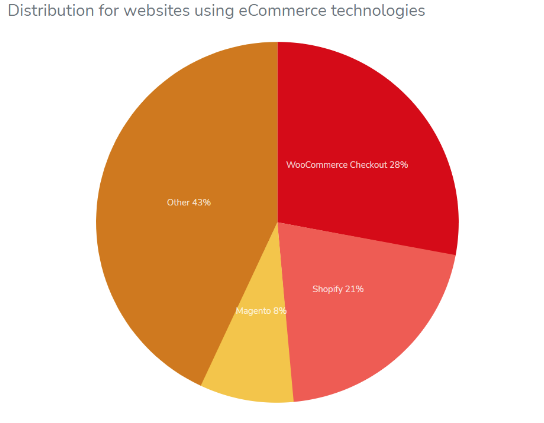Which eCommerce platform to use is vitally important because it affects the way your website will function. A good eCommerce platform enables you to create a highly efficient online store with more than simply an “add-to-cart” button. A seamlessly integrated system gives a comfortable experience to both owner and customer.
The choice of platform defines the entire eCommerce software development process. Developers prefer CMSs that feature regular updates, user-friendly documentation, various customization options, and of course, an active community.
It is easy to get lost in all the options as there are a lot of things to consider when developing an eCommerce website. To narrow down the choice, let’s start with the most popular platforms. Then we’ll look at what’s the best eCommerce platform according to the experts we interviewed. Here we go.
What are the most popular eCommerce platforms?
To begin with, let’s look at what everybody else is using…maybe they know something. What are the most popular eCommerce platforms by the number of users?
According to Builtwith, the following eCommerce technologies are used by the top 1 million websites:
- WooCommerce (WordPress) – 28%
- Shopify – 21%
- Magento – 8%
- Squarespace add to cart
- PrestaShop
- OpenCart
- Shopify Plus
- BigCommerce
As you can see, WooCommerce and Shopify each have a substantial share of the eCommerce market. They are in the lead here for a reason. Let’s have a look at their strong and weak points.
1. WooCommerce
It is the best eCommerce platform for WordPress being its dedicated plugin which allows the users to sell online. This platform is so popular because WordPress is already the most frequently used CMS for websites. It’s suitable for both small and medium-sized businesses. With WooCommerce, websites can sell both physical and digital products, and support different payment channels.
Pros:
- free
- highly customizable
- good for email marketing
- has an active community
Cons:
- insecure and prone to attack as hackers are attracted to its user base
- unreliable due to its fragile construction; with additional plugins, you risk crashing the whole website
- no customer support
- requires technical proficiency
- not hosted
2. Shopify
It is a proprietary SaaS platform for eCommerce. It is a good choice for startup owners without a technical background, but it’s also suitable for large online shops. When just starting out, however, we do not recommend you use Shopify since it is expensive and made for larger stores with a wider variety of products. There are several pricing options depending on the functionality you need. Shopify Plus is for enterprise-level solutions.
Pros:
- user-friendly
- offers a variety of tools and supports many channels
- good customer support
- has many built-in SEO features
Cons:
- free functions are limited
- extra fees for non-Shopify payments
3. Magento
It is a powerful and customizable system for developers with advanced technical knowledge.
Pros:
- offers individually-tailored solutions
- frequent updates
- great for SEO
- allows admin to manage multiple stores from a single panel
Cons:
- fully hosted software is complex and pricey
- updates must be installed manually
- you need to add a payment processor extension
4. Squarespace add to cart
It helps startups launch their website quickly and turn it into an online store for free.
Pros:
- easy drag-and-drop editor
- great inventory tracking tool
- add-to-cart button is free
Cons:
- limited integrations
- extra commission for transactions
- add-to-cart is a separate feature you need to insert into your website
5. PrestaShop
It is an open-source platform, perfect for those who have some tech background because there is no customer support to help figure everything out.
Pros:
- control over privacy settings
- affordable
- useful built-in features
Cons:
- might be difficult to use for inexperienced users
- complex maintenance
- tech support is available only with paid plans
6. OpenCart
It is an open-source platform for merchants. It is free software, which supports different add-ons to customize your solutions. It is easily integrated with many payment services.
Pros:
- many integrations are available
- multilingual system
- offers a variety of features
- free to use, affordable maintenance
Cons:
- limited built-in features
- difficult to customize
- complex update process
- difficult to add functions for new versions
7. BigCommerce
BigCommerce is a good place to start your store. It is also great for enterprise-level stores and offers good customization options including many profitable featur
Pros:
- offers many sales channels
- accepts international payments
- integrates with a lot of applications
- 24\7 customer support
Cons:
- you need to register your domain elsewhere
- limited free themes
- complex to use
What is the best eCommerce platform according to the experts?
We asked seasoned eCommerce practitioners which platform they would recommend. Many of them agreed that Shopify is their favorite. But why is Shopify the best eCommerce platform? Here are the reasons behind people’s choices.
1. Perfect for Mobile
“Shopify’s mobile readiness is a compelling reason for using the platform. Some platforms need tweaks and changes in order to be properly optimized for mobile shoppers. Others simply don’t work well with mobile optimization. All Shopify themes are automatically mobile responsive. This is important because a large percentage of shoppers use mobile devices to shop today.”
- Alina Clark from CocoDoc
2. 24\7 Customer Support
“One of the major benefits of using Shopify is that you don’t need to hire any developer for maintenance or to solve any issue because you will get 24/7 support from Shopify and they will personally fix your issues.”
- Joe Smith from iCrowdNewswire
3. Ease of Use
“Shopify CMS is easy to use and set up on your own. If you are a larger organization, it integrates with so many other software products. Cost is affordable and they maintain the hosting so that is one less headache.”
- Rob Delory from QuickSilver Agency
4. Easy to Scale
“One huge benefit to building on Shopify is it allows business owners to scale rapidly without interruptions in service, and any added cost.
When you sign up with Shopify you pay a fixed (and very reasonable) price per month, and the price isn’t affected by website traffic. If you build your own website and host it, or use a website backend like WordPress, you have to constantly manage servers which is a pain and more expensive by far.
Our site has scaled from under 3,000 monthly pageviews to 50,000 in under three months, and we have had no interruptions in service nor have we had to pay an extra dime to Shopify for managing this increased traffic.”
- Calloway Cook from Illuminate Labs Inc.
5. High Level of Security
“Also, you can make sure the data of your client and store is safe, as Shopify has level 1 PCI compliance and 256-bit SSL encryption for security. When you choose an eCommerce platform, consider the platform that runs on a single, unified platform and offers a complete customer view.”
- Shiv Gupta from Incrementors SEO Services
6. Easy for Dropshipping
“Shopify integrates with Oberlo to provide integrated dropshipping tools, and all plans allow you to sell an infinite number of products, making it the greatest option for dropshipping. This simple-to-use eCommerce platform includes the Shopify POS light system and a slew of features, including a live chat option and an online invoice creator.”
- Richard Latimer from Veritas Buyers
7. Comprehensive Analytics and Recommendations
“Huge amounts of data and comparable data included in the standard subscriptions. Unlike other platforms like WordPress/WooCommerce you can gain valuable insights from Shopify in how your store is compared against other stores that started at a similar time, total profit levels, and performance on a number of orders.
This can help you gauge whether you’re over, under, or sitting right as a business compared to other eCommerce ventures. This might seem small but it can help encourage and validate those doing well, or help those who may be underperforming to ask what they could do to improve their business.
Thankfully for the latter Shopify’s platform helps eCommerce businesses understand things they can do to encourage more visitors, increase conversions and optimize the overall customer experience.”
- Alison from Chastity Cage
8. Easy To Sell The Store
“Shopify has an internal marketplace where you can sell your store thanks to the verified backend data. This means that buyers can see verified traffic levels, revenue, and other important metrics which will increase the potential price of your company. The value of your business is derived from profit multiplied by a number – this number increases on more accurate data, store quality, and a number of other factors.”
- Alison from Chastity Cage
9. Best eCommerce Platform For SEO.
“Shopify’s on-page optimization is super easy since their backend is highly intuitive. Most eCommerce owners avoid SEO and organic traffic since they largely focus on ads. But still, I feel that blogging is something that long-term eCommerce brands should hold on to.”
- Vignesh Wadarajan from Vignesh Wadarajan
How to Choose The Best eCommerce Platform for Your Business?
There are many options to choose from when you are building your online store, and they are constantly changing. The perfect platform for you is the one that matches your business needs. First of all, you must decide whether you build a typical online store, or a complex marketplace with unique features.
All the platforms mentioned in this article can accommodate stores’ basic needs. WooCommerce and Shopify are the leaders in this area. WooCommerce is the most popular platform because it’s free, and because it’s compatible with WordPress. Nevertheless, Shopify is still the choice of a not insignificant number of eCommerce experts.
Reasons behind Shopify’s success:
- mobile-friendly
- 24\7 customer support
- good for beginners
- secure
- fits dropshipping
- built-in analytics
- allows the o selling of the your store within internal market
If you want to build a marketplace, you need custom eCommerce development. This will allow you to create a complex and well-integrated system that satisfies your every requirement. Such a multilayered solution demands technical proficiency, so find a reliable development team to bring your ideas to life.
Hopefully, this will help you make a decision.

































































